 |
 |
 |
 |
 |
 |
Concrete Revolutio grows more compelling every week.
There’s a crazy sort of brilliance to this series, I think. Make no mistake – it’s one of those “doomed to fail” shows Bones produces every so often, and seems destined to be on the honor roll of anime featuring the largest gulf between mass opinion and true worth. But that’s the great thing about art generally, anime specifically and Bones even more so – mass opinion doesn’t have any bearing on quality, and sometimes artists are willing to produce art that isn’t suited to mass opinion.
It’s been growing increasingly clear in recent weeks that the true core theme of Concrete Revolutio was moral ambiguity, and that’s never been more inescapable than in an episode like this more. To narrow it down even further, I think this series is about our desire to see things as black and white – the need to believe we know what’s good and what’s evil, and can live our lives based on that knowledge. Even more, I think Aikawa Shou is musing on the moral certitude that exists in childhood, and is one of the things sacrificed when we become adults.
To illustrate that point, Aikawa and Mizushima give us the story of Earth-chan (Taketatsu Ayana), who we’ve briefly met before, and Judas (Tachibana Shinnosuke) who we have not. Adding to the seemingly endless list of tropes in this series (next week we’re getting the boy detectives “BL Clan”) Earth-chan is a satellite – a robot created by someone who picks up on the distress signals of humans in trouble, and comes to their rescue (seemingly getting something like an endorphin rush in the process). As for Judas, he’s a boy who was part of a gang of master crooks called the “Diamond Eaters” who now says he wants to go straight and join the Superhuman Bureau.
If there were any doubt as to the theme of Concrete Revolutio, Earth-chan personifies it to a ridiculous extent – her entire existence is conditioned on defining people as good or evil, and choosing the right side. As if there were any chance we could miss the point Mizushima beats us over the head with it hilariously, showing us Earth-chan saving baby birds and stopping sports cars so mother cats carrying kittens and old ladies can cross the street. But as we know, seeing true good and evil isn’t so easy, and Judas is a prime example of this. Essentially, when he says he wants to be good what he really wants is for good and evil to be easy things to understand – but alas, they’re not. And no amount of wishing can make it so.
There’s another very clever element here that ties into a second major them of Concrete Revolutio, and that’s the way Earth-chan’s participation in any conflict is treated as a huge public relations battle. The real conflict in this series is a P.R. war, and what Earth-chan does drives public opinion. What she does is perceived to be good whether it is or not – the cart comes very much before the horse. And when it comes to something like a protest movement against Japanese participation in an international alliance to fight “evil” beings from space, defining good and evil isn’t so easy – and getting Earth-chan on one side or the other is a crucial factor in winning the day.
We’ve seen this before – protesters on one side, the government on the other, protests turning violent. Judas chooses a side, and is forced to break a promise to Earth-chan and use his powers when things go bad. This sort of conflict is clearly sowing the seeds for the eventual split between Jirou and the Bureau – and Judas, it seems, will end up joining forces with him in the future (by Year 47, someone has taken out Earth-chan and seemingly deactivated her in violent fashion). There’s an element of individuality vs. collectivism in here on top of everything else – which is a big theme in Japan, with its hard-wired sense of responsibility to society – but no clean, easy answers about which side is “right”.
There’s one more message Aikawa and Mizushima seem to be pressing home here, and it’s this: whatever good and evil are, truth is not necessarily good and lies are not necessarily evil. Kikko gives Earth-chan candies and tells her they “allow machines to dream”. Later, she admits what they really are is “lies” – but sometimes, lies are needed. When Earth-chan dreams what she dreams of is a lie – a false reality where rather than a lonely satellite floating in the cold of space, she’s a normal human girl with a family. But lie or not, she smiles when she sees that reality – and it’s the lie that allows her to grit her teeth and endure her truth, because she can go back to that lie when the truth becomes too much to bear. As I said, a crazy sort of brilliance – and there’s something powerfully true in that depiction of a lie.
 |
 |
 |
 |
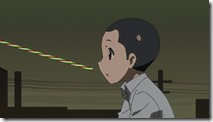 |
 |
 |
 |
 |
 |
 |
 |
 |
 |
 |
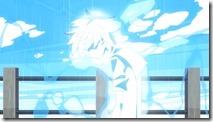 |
 |
 |
 |
 |
 |


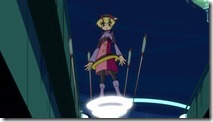
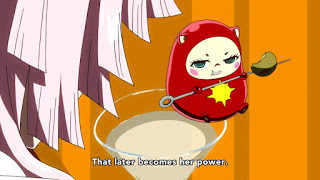
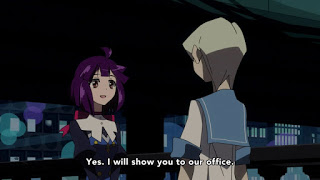
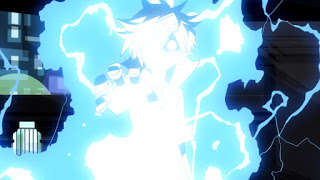
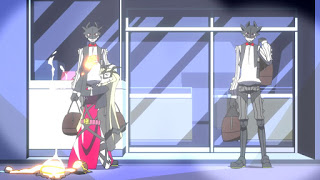
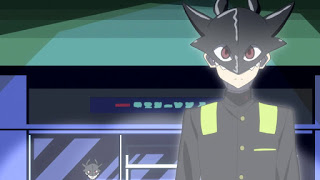
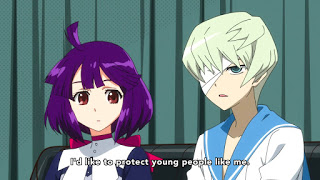
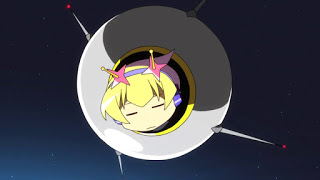


Kamui
November 16, 2015 at 6:32 amThere is only one word I can use to describe this episode: Brilliance. It was magnificent in every aspect, even the subtle dig at Magical Girls at the beginning was amusing. I loving this anime a lot, so of course it would fail miserably in almost every aspect, especially the commercial one.
Unknown
November 17, 2015 at 6:57 amGreat blogging so far, C.R. has become my favorite of this season. One of the coolest things about it is that much of its settings and plot is derived from actual events in Japanese history! For example, the "Black Fog" in ep. 2 was a reference to a Japanese political scandal of the same name (not unlike Watergate in America). The train crash in ep. 5 was based on a real train crash in Japan in 1967. In ep. 6, Mountain Horse references playing at the Budokan in June 1966 – which is when The Beatles played there in real life (i.e. The Beatles are superhuman). And the airport protest at the end of this episode was based on a real protest at Haneda airport, October 1967. These parallels and more are just too cool, but they're flying far over the heads of western audiences